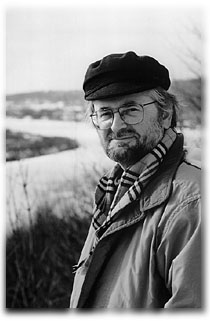Main Menu · Search ·Current Issue ·Contact ·Archives ·Centennial ·Letters to the Editor ·FAQs
 OTTO POHL
OTTO POHL |
When reporter Serge Schmemann '67 was first assigned to Moscow in 1980, he hoped to visit the corner of Russia described in his grandfather's memoirs and see what remained of the estate his mother's family had owned before the revolution. But the Soviet government stubbornly denied him access to the area. In the 1980s, says Schmemann, expatriate Russians were regarded as not really Russian at all, and families like his own were derided as "White Guardist trash": "We were not welcome, and we were especially not welcome to go rummaging around for our roots." That kind of reception increased Schmemann's resolve to claim his heritage: "I wanted to assert that I, too, had a right to Russian history and culture, that Russia is a part of me and I am a part of it. I was going to affirm my claim, and compel them to recognize it."
Two tours of duty in Russia as correspondent and Moscow bureau chief for the New York Times, from 1980 to 1986 and from 1991 to 1994, helped him complete his mission. As the Soviet Union was breaking down, Schmemann succeeded in making his way to the village of Koltsovo, 90 miles south of Moscow, and talking to local people about their memories of the old days, which had been expunged from official history. (Ironically, the formerly "suspect outsider" was greeted by some villagers as a presumed millionaire savior whose deep American pockets would rescue the local economy.) Eventually he decided to write a book to recreate a sense of the place, to "show what it was like at various points in its history and try to draw some lines between them."
Schmemann's journalistic skills earned him a Pulitzer Prize in 1991 for his coverage of German reunification, but he found writing the book difficult--it required an approach very different from his daily reporting. "It felt like learning a new craft," he recalls. "Ideally, everyone who wants to write a book should write more than one, so they go on using the new skill once they've acquired it!" He says his training as an English concentrator proved helpful, particularly insights he absorbed from one tutor, Neil Rudenstine: "He had a great eye for the use of color and detail in writing; we all gained a lot of appreciation for them. He ran a terrific tutorial."
Schmemann's narrative has now been published as Echoes of a Native Land: Two Centuries of a Russian Village (Knopf). Drawing on family memoirs and interviews, he reconstructs and interweaves two histories, that of his relatives, landowners who were declared "former people," and that of the village and its inhabitants as life went on there during the Soviet era. The two strands finally join again as the author returns to the village and witnesses its residents struggling to adapt to the changes of the recent past. Schmemann became convinced, he says, that the ultimate success of their efforts depends on achieving an accurate understanding of the legacy of the past, to which he hopes to contribute with his book. "Historical continuity can't be denied, or forcibly broken," he says. "You can't live without a history. You have to know where you came from if you're going to move on."
~ Deborah Schneider